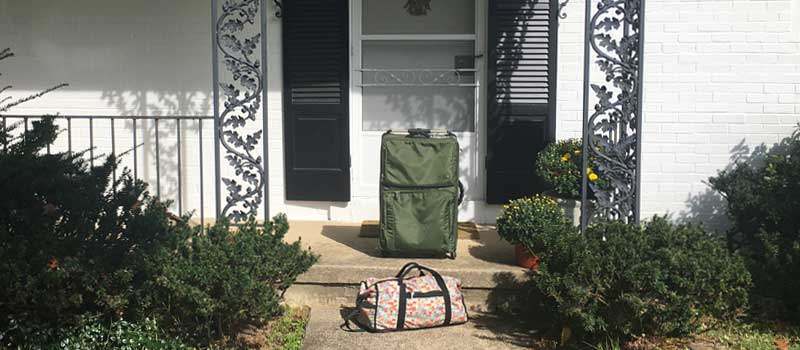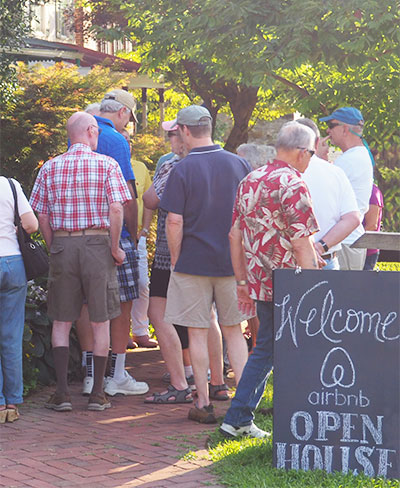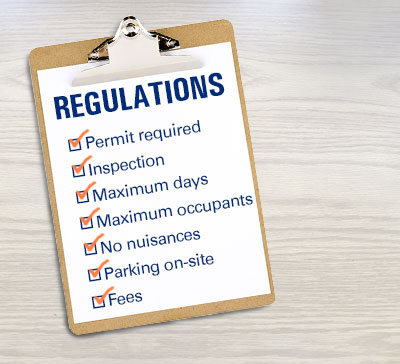The popularity of short-term rentals has grown in the region, particularly in tourist and business destinations.
How it Works
With the rise of the sharing economy, short-term rentals have become an attractive option for homeowners and travelers looking to rent residences for a limited duration, often in lieu of a traditional hotel stay. Short-term rentals are particularly popular options in communities with higher lodging demand, such as those that have thriving business or entertainment districts, are seasonal destinations, have significant tourism attractions, are in close proximity to universities, or offer large special events (fairs, concerts, festivals, etc.).
Chester County is an attractive destination for tourism, professional centers, and institutes of higher learning. These industries result in lodging demand, and residents who are interested in renting their homes or portions of their homes as short-term rentals. This tool provides guidance to municipalities interested in allowing and regulating short-term rentals. Municipalities may regulate this relatively new use through regulatory tools such as zoning ordinances or building codes. Regulations can address issues encountered with short-term rentals.
Benefits
Neighborhood Compatibility
Residents opposed to short-term rentals often cite neighborhood disturbances such as increased traffic, noise, nuisance, and neglected property maintenance. By establishing clearly defined regulations for short-term rentals, municipalities can be proactive to minimize disturbances in the local community.
Housing Supply
Municipalities can choose to regulate short-term rentals in a manner sensitive to housing availability and affordability. Regulations can be implemented which specify the maximum number of nights a home can be rented, or prevent the purchase of homes specifically for the use of short-term rentals.
Municipal Regulatory Control
When undefined by the local municipality, short-term rentals may be difficult to adequately and legally regulate. The inclusion of short-term rental regulations in local ordinances allows for municipalities to identify specific concerns in their community and set criteria that acknowledge these concerns./p>
Municipalities should clearly define regulations and permit requirements for short-term rentals.
Get Started
Municipalities should identify their overall goals in drafting specific regulations for short-term rentals. These goals may be to develop standards to address community concerns already being experienced in existing neighborhoods or to address the use in a proactive manner before such issues occur. The following items should be considered when developing short-term rental standards:
1) Determine whether short-term rental regulations should consist of a standalone ordinance or be incorporated into the municipal zoning ordinance. Pennsylvania case law generally acknowledges that municipalities may regulate short-term rentals in zoning ordinances, although regulations for short-term rentals should be specifically defined and all use restrictions must stem from a valid and reasonable exercise of police power.
2) Consider how short-term rentals are to be defined and regulated. The following are examples of specific items to consider when creating regulations for short-term rentals:
- Define short-term rentals and determine whether short-term rentals should be considered a residential or commercial use. (Note: In instances where short-term rentals are considered a commercial use, they may be eligible for lodger's tax, similar to traditional hotel and bed and breakfast taxes.)
- Determine whether short-term rental restrictions should include only shared rooms and private rooms, and/or whether rental of the entire home should be permitted.
- Determine in which zoning districts short-term rentals should be permitted and determine whether short-term rentals should be permitted by right, conditional use, or special exception.
- Consider including restrictions such as the maximum number of nights a residence can be rented per year, nuisance regulations, signage restrictions, and ownership restrictions.
- Determine the application and permitting means for short-term rentals, including enforcement measures.
- Consider what parking requirements should apply to short-term rentals.
Municipalities should ensure their short-term rental ordinance is in legal conformance with the Pennsylvania Municipalities Code and other Pennsylvania state regulations. Review by the municipal solicitor is recommended due to the relative newness of this use. Legal challenges may be minimized with the construction of an ordinance which conforms to regulations of police power and contains concise and reasonable regulations for short-term rentals.
Considerations
Neighborhood Opposition
Short-term rentals may differ from the nature of the surrounding neighborhood. Residents may have concerns about frequently changing occupants who may be unaware of local ordinances, regulations, and community culture. Regulations on ownership restrictions, enforcement, reporting, and rental night maximums help to address these concerns.
Housing Availability and Affordability
Units available for short-term rental may limit the number of traditional long term rental units available and may even reduce the number of homes available for sale. Similarly, the purchase of homes for the sole purpose of short-term rental is a related issue that should be carefully examined and may be avoided by adopting appropriate regulations. This situation may be especially prevalent in affluent communities or communities with high tourism demand. Conversion to short-term rentals has the potential to drive up housing costs in neighborhoods where there is high demand for short-term lodging. Municipalities may want to consider limiting short-term rentals to shared or private rooms in owner occupied houses to address this issue.
Commercial Lodging
The presence of short-term rentals may have negative economic impacts on existing commercial lodging facilities such as hotel and bed and breakfast facilities. Without regulation, short-term rentals may have lower startup costs causing commercial lodging facilities to be unable to compete. If not taxed, short-term rentals reduce lodging revenue earned by municipalities. Municipalities may want to consider lodging taxes, enforcing maximum rental nights, or maximum number of short-term rentals per neighborhood to address these issues.
Regulatory Constraints
Short-term rentals can be difficult to regulate, and a clear regulatory process needs to be defined by the community prior to permitting these rentals. As short-term rental regulations are frequently evolving, municipalities must be careful to consider potential inadvertent impacts of short-term rental regulations such as unintended impacts for the non-commercial renting of rooms or traditional long-term rentals. Considerations include the application and permitting process, licensing and taxing options, and the enforcement process.
Municipalities should consider and clearly define and delineate types of commercial accommodations in order to differentiate short-term rentals from more traditional hotel or motels in addition to potentially limiting where such uses are permitted. Common differentiations between short-term rentals and hotel accommodations are: maximum number of renters permitted, locations in primarily residential versus commercial zoning districts, and owner/operator residency requirements. Municipal solicitors should be involved in the development of regulations and consult current case law regarding short-term rentals.
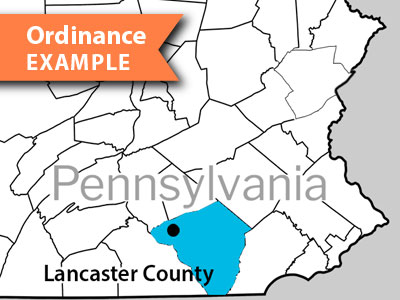
Examples
Elizabethtown Borough (Lancaster County)
Elizabethtown Borough defines a set number of maximum permitted transient occupants per zoning district and contains provisions for noise, potential disturbances, and conformance standards for short-term rentals. These conformance standards address off-street parking, licensing, maximum length of stay, and maximum number of cumulative days a unit can be rented.
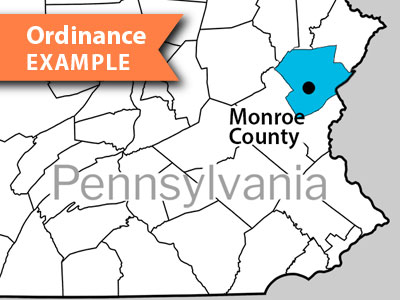
Jackson Township (Monroe County)
Jackson Township's short-term rental ordinance requires that a permit be required for all short-term rentals. Permit requirements include property owner contact information, a floor plan of the rental unit, and a site plan of the property among other items. This ordinance contains a number of short-term rental standards including maximum length of rental occupancy, parking requirements, noise regulations, and other requirements. Additionally, this ordinance delineates inspection requirements as well as violation and penalty procedures.
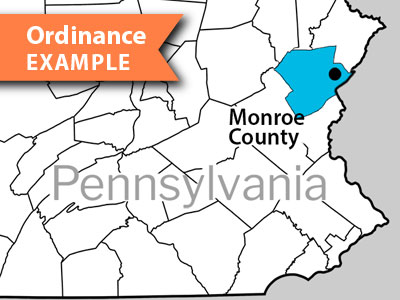
Middle Smithfield Township (Monroe County)
Middle Smithfield Township contains provisions in its zoning ordinance which regulates the location, use requirements, and permitted zoning districts for short-term rentals. Other municipal codes have been modified to emulate the standards for short-term rentals as discussed in the zoning ordinance.
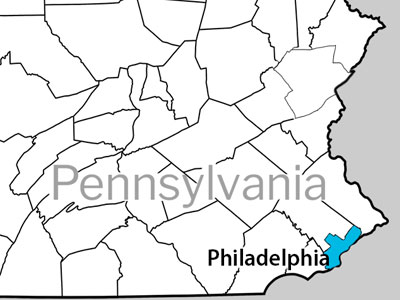
City of Philadelphia
The City of Philadelphia regulates short-term rentals (referred to as limited lodging) through the Department of Licenses and Inspections. A number of regulations exist for homeowners seeking to rent all of, or a portion of, their property for a limited duration. Regulations address maximum number of nights a unit can be rented, building regulations for short-term rentals, licensing and permitting requirements, and information regarding the City of Philadelphia hotel tax.


